International Jazz Day is an annual event celebrated on April 30th to recognize the importance of jazz music as a means of promoting peace, unity, and dialogue among people from different cultures and backgrounds. The event was established by the United Nations Educational, Scientific and Cultural Organization (UNESCO) in 2011, in recognition of jazz music’s role in promoting understanding, tolerance, and respect for human rights and diversity.
The history of International Jazz Day
International Jazz Day was established by the United Nations Educational, Scientific, and Cultural Organization (UNESCO) in November 2011, as a way to recognize jazz music as a universal language of freedom, creativity, and unity. The idea for the event was proposed by jazz pianist and UNESCO Goodwill Ambassador Herbie Hancock, who saw the need to raise awareness about the power of jazz music to promote intercultural dialogue, understanding, and cooperation.
The first International Jazz Day was celebrated on April 30, 2012, with events taking place in more than 190 countries. The day was marked by concerts, jam sessions, master classes, and other activities aimed at celebrating the rich history and diversity of jazz music. The inaugural concert was held at the United Nations General Assembly Hall in New York City, featuring performances by Hancock, Dee Dee Bridgewater, Dianne Reeves, Wayne Shorter, Esperanza Spalding, and other renowned jazz musicians.
Since then, International Jazz Day has been celebrated annually, with a different host city and country each year. Some of the host cities have included Istanbul, Turkey (2013), Osaka, Japan (2014), Paris, France (2015), Washington, D.C., USA (2016), Havana, Cuba (2017), St. Petersburg, Russia (2018), and Melbourne, Australia (2019). Due to the COVID-19 pandemic, the 2020 and 2021 celebrations were held virtually.
International Jazz Day has become a global movement, uniting jazz musicians, educators, students, and fans from around the world. The day is a celebration of jazz music’s ability to transcend cultural and social barriers, and to inspire creativity, innovation, and collaboration. It also serves as a reminder of the need to preserve and promote jazz music as an art form, and to recognize its contribution to the world’s musical heritage.
International Jazz Day Celebration
International Jazz Day is a time to celebrate the rich cultural heritage of jazz music and its contributions to the world’s musical traditions. Here are some ways to celebrate this special day:
- Attend a Jazz Concert: Check out local jazz clubs or concert venues for live jazz performances. Celebrate with the community, and enjoy the music.
- Listen to Jazz Music: Listen to some classic jazz albums or discover new artists on streaming services. Enjoy the genre’s rich melodies, harmonies, and rhythms.
- Learn about Jazz History: Read books, watch documentaries, or attend lectures to learn about the history of jazz music and its cultural significance.
- Participate in a Jam Session: Participate in a jam session or open mic night. Improvise and play jazz music with other musicians.
- Host a Jazz Party: Invite friends and family over to celebrate International Jazz Day with a jazz-themed party. Play jazz music, have food and drinks, and encourage everyone to dress up in their best jazz-inspired outfits.
- Support Jazz Artists: Buy tickets to jazz concerts or purchase jazz albums from local artists. Support the work of jazz musicians and help preserve the legacy of this unique musical genre.
- Share Your Love for Jazz: Share your favorite jazz albums or artists on social media. Encourage others to explore the genre and discover the beauty of jazz music.
- Organize a Jazz-themed Event: Plan an event in your community that celebrates jazz music, such as a jazz festival or a jazz-themed dance party.
- Take a Jazz Dance Class: Learn to dance to jazz music by taking a jazz dance class. Enjoy the energy and rhythm of the music through movement.
- Watch a Jazz Film: Watch a film that celebrates jazz music, such as “Round Midnight” or “Whiplash.” Enjoy the storytelling and the music.
- Visit a Jazz Museum or Exhibition: Visit a jazz museum or exhibition to learn more about the history of jazz music and its cultural significance.
- Play Jazz Video Games: Play video games that feature jazz music, such as “Rock Band” or “Jazz Jackrabbit.” Have fun while enjoying the music.
- Cook a Jazz-inspired Meal: Cook a meal inspired by jazz music, such as New Orleans-style gumbo or Creole jambalaya. Enjoy the flavors and the music.
- Learn to Play an Instrument: Learn to play a jazz instrument, such as the saxophone, trumpet, or piano. Discover the beauty of jazz music through playing.
- Teach Someone About Jazz: Teach someone else about jazz music, such as a family member, friend, or student. Share your love and knowledge of the music.
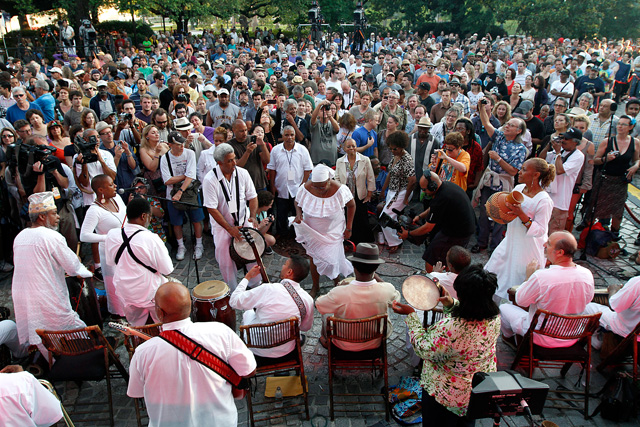
Jazz music and its impact on society
Jazz music has had a significant impact on society throughout its history. Here are some ways in which jazz music has influenced society:
- Breaking down racial barriers: Jazz music has a unique ability to bring people together, regardless of their race or ethnicity. In the early 20th century, jazz was one of the first art forms to feature black and white musicians playing together on stage. Jazz helped to break down racial barriers and promote understanding and acceptance among different groups of people.
- Cultural expression and identity: Jazz music has become a significant form of cultural expression for African Americans and other minority groups. Jazz musicians have used their music to express their cultural identity and convey messages of social justice and equality.
- Influencing popular culture: Jazz music has had a significant impact on popular culture, influencing other music genres such as rock and hip-hop. Jazz musicians have also contributed to the development of film and television soundtracks.
- Promoting freedom and individuality: Jazz music has always been associated with freedom and individuality. Jazz musicians are known for their improvisational skills and ability to express themselves creatively. Jazz music has encouraged people to embrace their uniqueness and express themselves freely.
- Inspiring social movements: Jazz music has played a significant role in inspiring social movements throughout history. During the civil rights movement in the United States, jazz musicians such as John Coltrane and Nina Simone used their music to express their support for the movement and call for change.
- Fostering international relations: Jazz music has helped to foster international relations and promote cultural exchange between different countries. Jazz musicians have traveled around the world, performing in different countries and collaborating with local musicians, promoting cultural understanding and goodwill.
Jazz music has had a significant impact on society, promoting unity, cultural expression, and social change. Its unique ability to bring people together has made it an important art form that continues to be celebrated and enjoyed by people from all walks of life.
International jazz festivals
International jazz festivals are events that showcase some of the best jazz musicians from around the world. These festivals provide a platform for established and emerging artists to perform in front of large audiences, collaborate with other musicians, and gain exposure to new fans.
Here are some of the top International jazz festivals held around the world:
- Montreux Jazz Festival: This festival is held annually in Montreux, Switzerland, and is considered one of the most prestigious jazz festivals in the world. It features a diverse lineup of jazz, blues, and rock artists, and has hosted legends such as Miles Davis, Ella Fitzgerald, and B.B. King.
- North Sea Jazz Festival: This festival takes place in Rotterdam, Netherlands, and is known for its diverse lineup of jazz, blues, and world music. It has featured some of the biggest names in jazz, including Herbie Hancock, Wayne Shorter, and Chick Corea.
- Monterey Jazz Festival: Held annually in Monterey, California, this festival is one of the longest-running jazz festivals in the world. It has showcased legendary artists such as Louis Armstrong, Dizzy Gillespie, and Thelonious Monk, and continues to attract top talent from around the world.
- Tokyo Jazz Festival: This festival is held annually in Tokyo, Japan, and features both local and international jazz artists. It is known for its diverse lineup, which includes traditional jazz, fusion, and experimental jazz.
- Umbria Jazz Festival: Held annually in Perugia, Italy, this festival is known for its blend of traditional and contemporary jazz. It has featured artists such as Wynton Marsalis, Keith Jarrett, and Chick Corea, and attracts jazz enthusiasts from around the world.
- Vancouver International Jazz Festival: This festival takes place annually in Vancouver, Canada, and features a diverse lineup of jazz, blues, and world music. It has showcased both established and emerging artists, including Esperanza Spalding, Kurt Elling, and Pat Metheny.
- Jazz à Vienne: This festival is held annually in Vienne, France, and is known for its diverse lineup of jazz, blues, and world music. It has featured artists such as Al Jarreau, Diana Krall, and Marcus Miller.
- Cape Town International Jazz Festival: Held annually in Cape Town, South Africa, this festival is the largest jazz festival on the African continent. It features both local and international jazz artists and has hosted legends such as Hugh Masekela and Abdullah Ibrahim.
- Java Jazz Festival: This festival is held annually in Jakarta, Indonesia, and is known for its diverse lineup of jazz, blues, and world music. It has featured artists such as Stevie Wonder, James Brown, and Earth, Wind & Fire.
- Jazzaldia: Held annually in San Sebastian, Spain, this festival is known for its blend of traditional and contemporary jazz. It has featured artists such as Norah Jones, Jamie Cullum, and Diana Krall, and attracts jazz enthusiasts from around the world.
International jazz festivals provide an excellent opportunity for jazz lovers to experience some of the best music from around the world. These festivals are known for their diverse lineups, unique settings, and opportunities to discover new and emerging artists.

International Jazz communities
International jazz communities refer to groups of individuals and organizations around the world who are passionate about jazz music and work to promote and preserve its history, culture, and traditions. These communities are made up of musicians, educators, enthusiasts, and organizations that collaborate to support the growth and development of jazz music worldwide.
Here are some examples of international jazz communities:
- Jazz Education Network (JEN): JEN is a global organization that aims to advance jazz education, promote jazz music, and support the jazz community worldwide. It provides resources and opportunities for jazz educators, musicians, and enthusiasts to connect and collaborate.
- International Jazz Day: International Jazz Day is a UNESCO-sponsored event celebrated annually on April 30th. It is a day that brings together jazz enthusiasts, musicians, and communities worldwide to celebrate the art of jazz, its cultural significance, and its role in promoting peace, dialogue, and unity.
- European Jazz Network (EJN): EJN is a network of jazz organizations and festivals across Europe that works to support the jazz community in Europe. It provides opportunities for musicians to perform and connect with audiences across the continent and supports the development of jazz education programs.
- International Association for Jazz Education (IAJE): IAJE is a global organization that aims to promote jazz education, performance, and research. It provides resources and support for jazz educators and musicians, including professional development opportunities, conferences, and publications.
- Jazz Foundation of America: The Jazz Foundation of America is a non-profit organization that provides support and assistance to jazz musicians and their families in times of need. It also promotes jazz education and preserves jazz history through its programs and initiatives.
- African Jazz Network (AJN): AJN is a network of jazz organizations and festivals across Africa that works to promote African jazz music and support the development of jazz education programs on the continent. It provides opportunities for African jazz musicians to perform and connect with audiences across Africa and around the world.
- International Society for Improvised Music (ISIM): ISIM is a global organization that aims to promote the art of improvised music and support the development of improvisation skills in musicians. It provides resources and opportunities for improvisers, educators, and enthusiasts to connect and collaborate.
- Latin American Jazz Network (LAJN): LAJN is a network of jazz organizations and festivals across Latin America that works to promote Latin American jazz music and support the development of jazz education programs in the region. It provides opportunities for Latin American jazz musicians to perform and connect with audiences across the region and beyond.
In conclusion, international jazz communities are vital in promoting and preserving the culture and traditions of jazz music. They provide resources, support, and opportunities for jazz musicians, educators, and enthusiasts worldwide to connect and collaborate, and to advance the art of jazz.
International Jazz Day related Facts
Here are some interesting facts related to International Jazz Day:
- The firstInternational Jazz Daywas celebrated on April 30, 2012, in Paris, France, with a concert featuring jazz legends such as Herbie Hancock, Wayne Shorter, and Dee Dee Bridgewater.
- Jazz music originated in New Orleans, Louisiana, in the early 20th century and has since spread throughout the world, influencing countless musicians and musical styles.
- The word “jazz” may have originated from a slang term used in New Orleans in the early 1900s, which meant to “have a good time.”
- Jazz music has its roots in African American culture and has been an important form of expression and resistance against racism and social injustice.
- Jazz musicians often use improvisation in their performances, making each performance unique and spontaneous.
- Jazz music has been recognized by
UNESCOas a “universal language of freedom” and a means of promoting peace, dialogue, and mutual understanding. - Jazz is a highly collaborative genre, with musicians often playing together in small groups or big bands.
- Some of the most famous jazz musicians include Louis Armstrong, Duke Ellington, Charlie Parker, Miles Davis, and John Coltrane.
- Jazz festivals are held all over the world, and some of the most famous ones include the Montreux Jazz Festival in Switzerland, the Newport Jazz Festival in the United States, and the North Sea Jazz Festival in the Netherlands.
- Jazz music has influenced many other genres, including rock, hip-hop, and electronic music, and continues to inspire new musicians and musical styles.
International Jazz Day Images
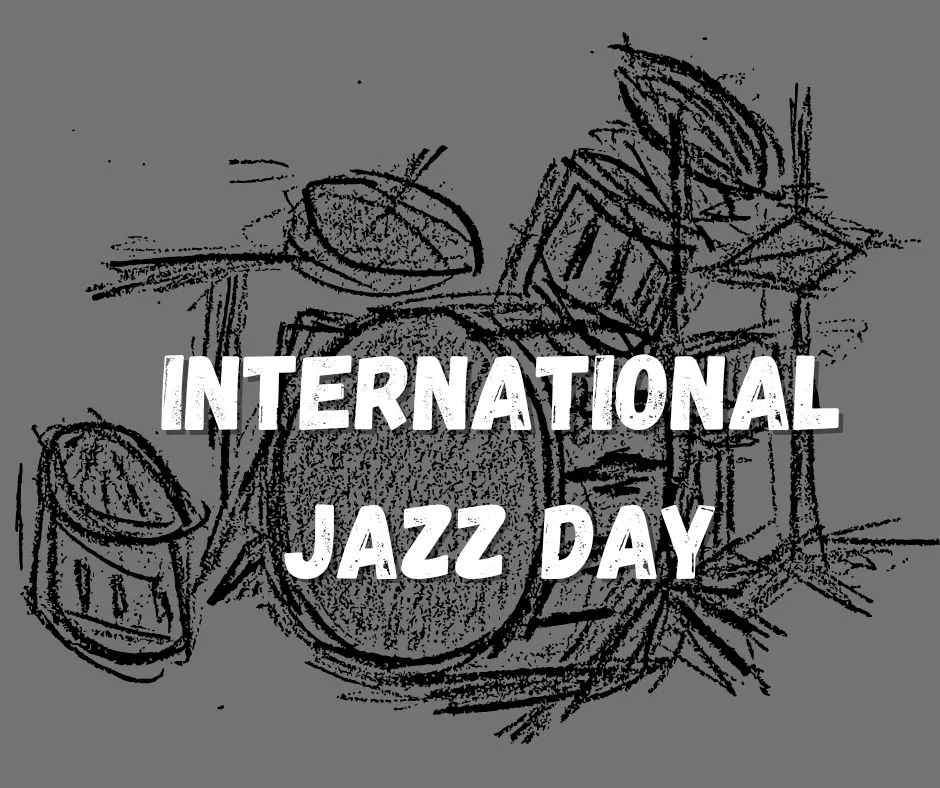
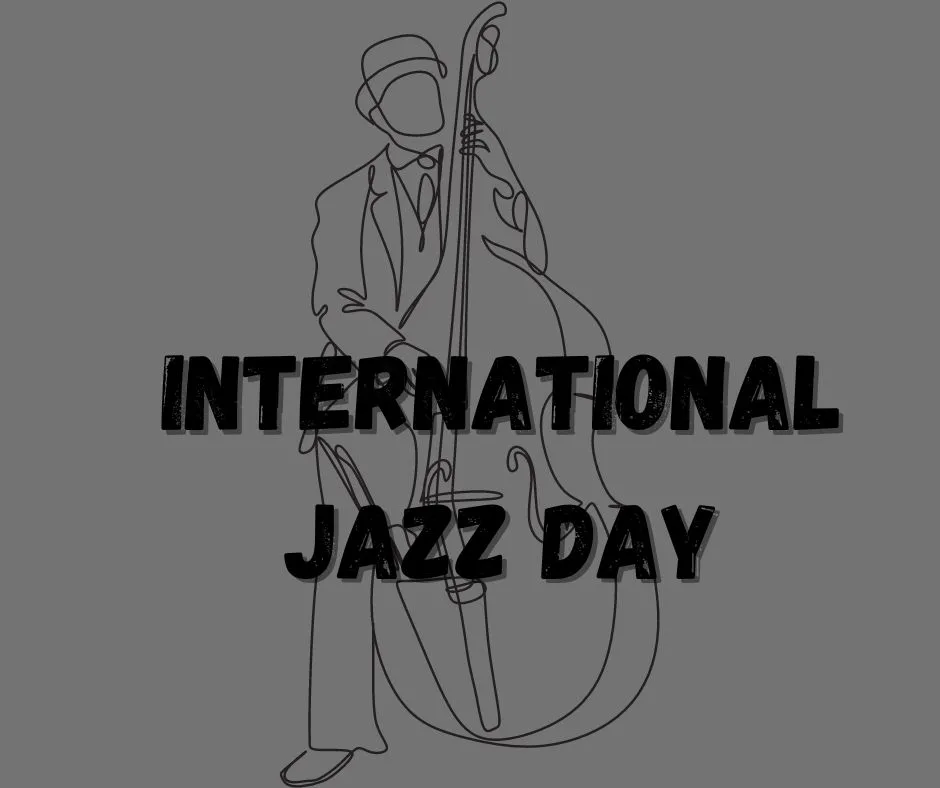
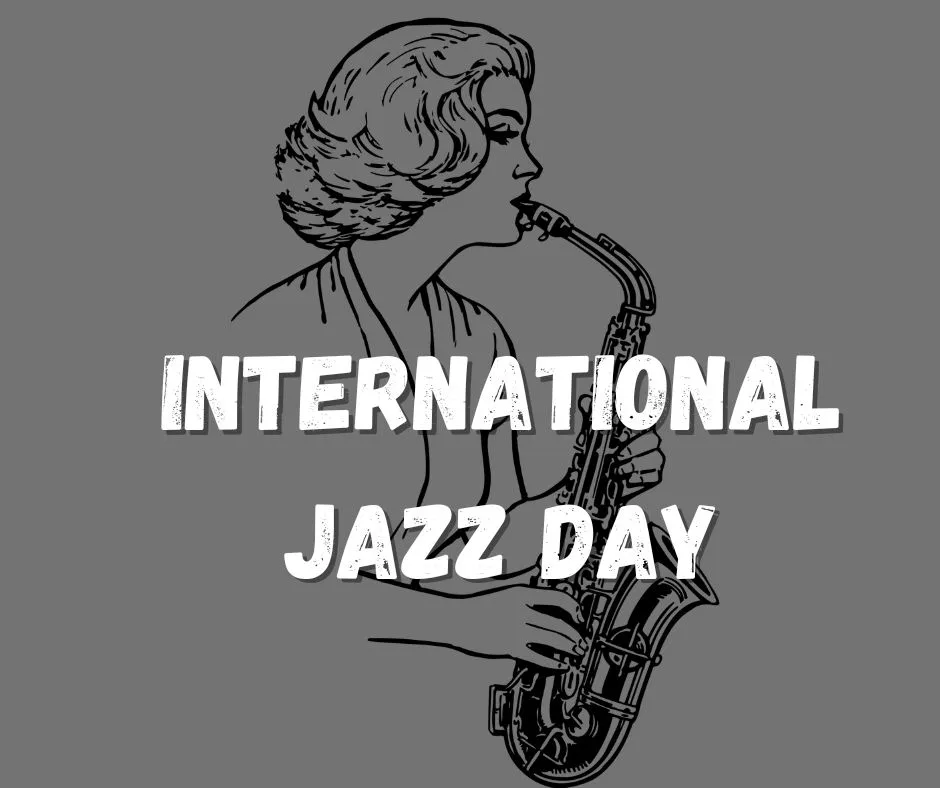
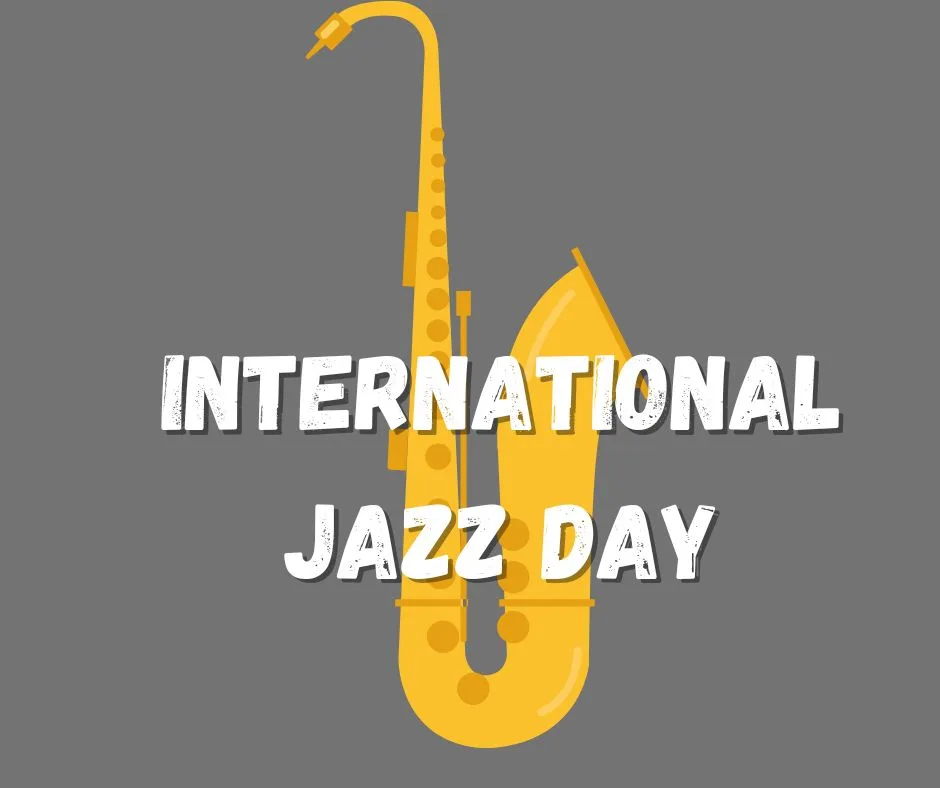
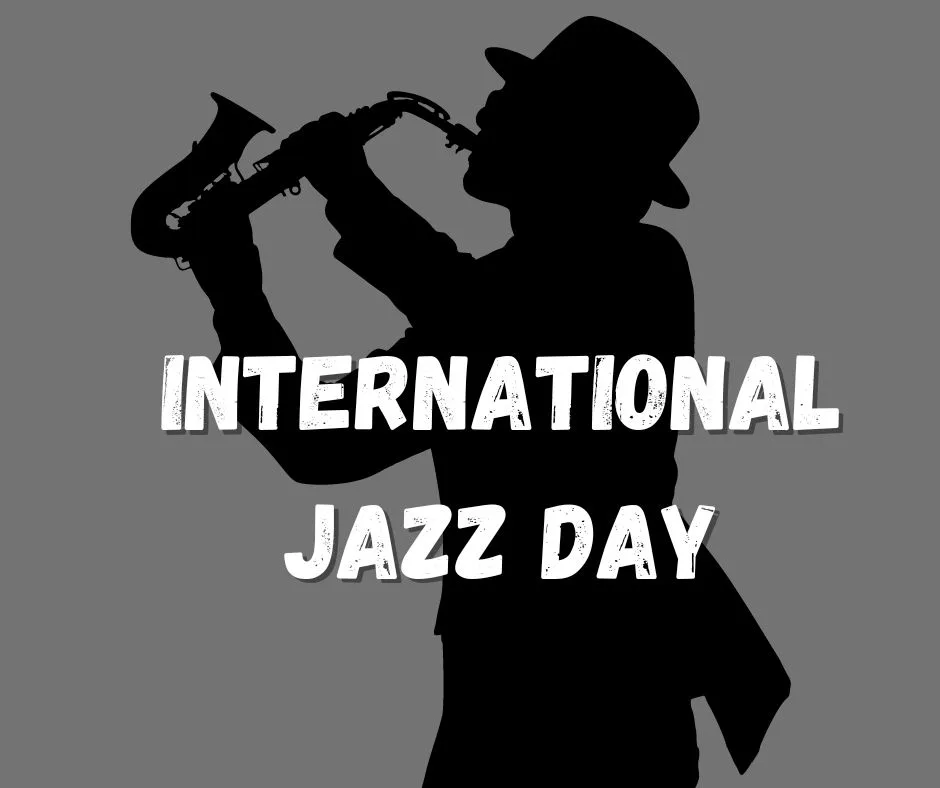
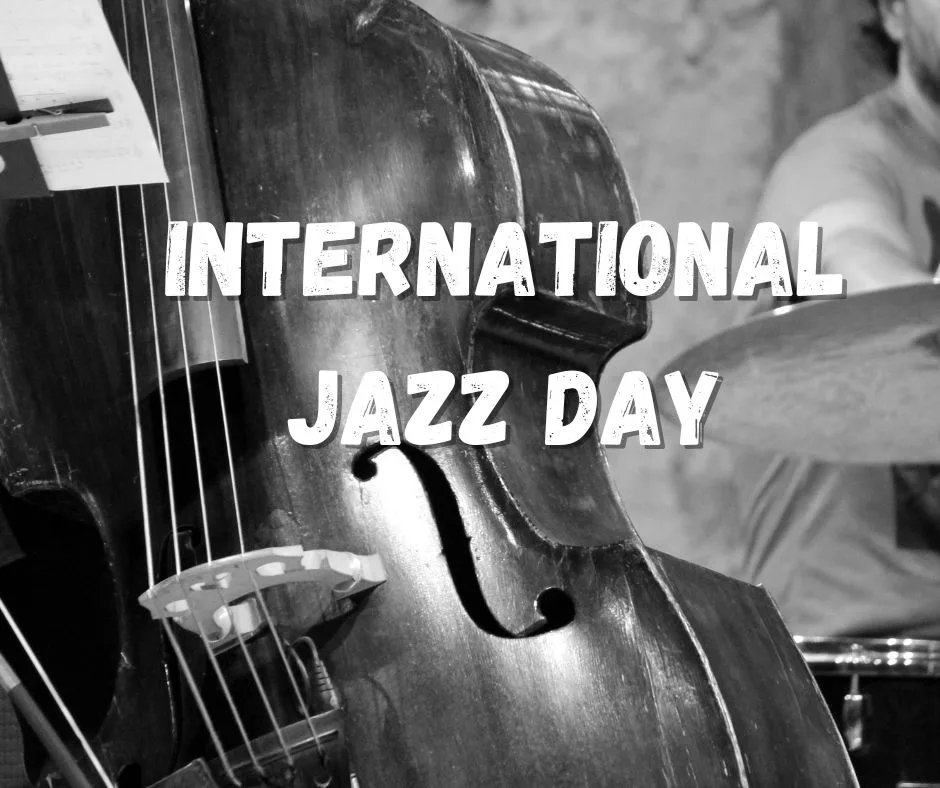
International Jazz Day related FAQs
When was the first International Jazz Day celebrated?
The first International Jazz Day was celebrated on April 30, 2012.
Who established International Jazz Day?
International Jazz Day was established by the United Nations Educational, Scientific and Cultural Organization (UNESCO) in 2011.
Why was International Jazz Day created?
International Jazz Day was created to recognize jazz music as a means of promoting peace, unity, and dialogue among people from different cultures and backgrounds.
Which country hosts International Jazz Day each year?
International Jazz Day is hosted by a different country each year. Some past hosts have included France, Turkey, and the United States.
Who are some famous jazz musicians?
There are many famous jazz musicians, including Louis Armstrong, Duke Ellington, Miles Davis, John Coltrane, Ella Fitzgerald, and Billie Holiday.
What is the difference between jazz and other music genres?
Jazz music is characterized by improvisation, syncopated rhythms, and a unique harmonic language. Unlike other music genres, jazz often features solo improvisation and a focus on individual expression.
How has jazz music influenced other music genres?
Jazz music has influenced many other music genres, including rock, hip-hop, and electronic music. Jazz fusion, which combines jazz with elements of other genres, has also led to the creation of new music styles.
What are some famous jazz festivals?
Some famous jazz festivals include the Montreux Jazz Festival in Switzerland, the Newport Jazz Festival in the United States, and the North Sea Jazz Festival in the Netherlands.
How has technology impacted jazz music?
Technology has impacted jazz music in many ways, from the recording and distribution of music to the use of electronic instruments and digital effects.
How can I celebrate International Jazz Day ?
You can celebrate International Jazz Day by attending a jazz concert, listening to jazz music, or learning more about the history and cultural significance of jazz.